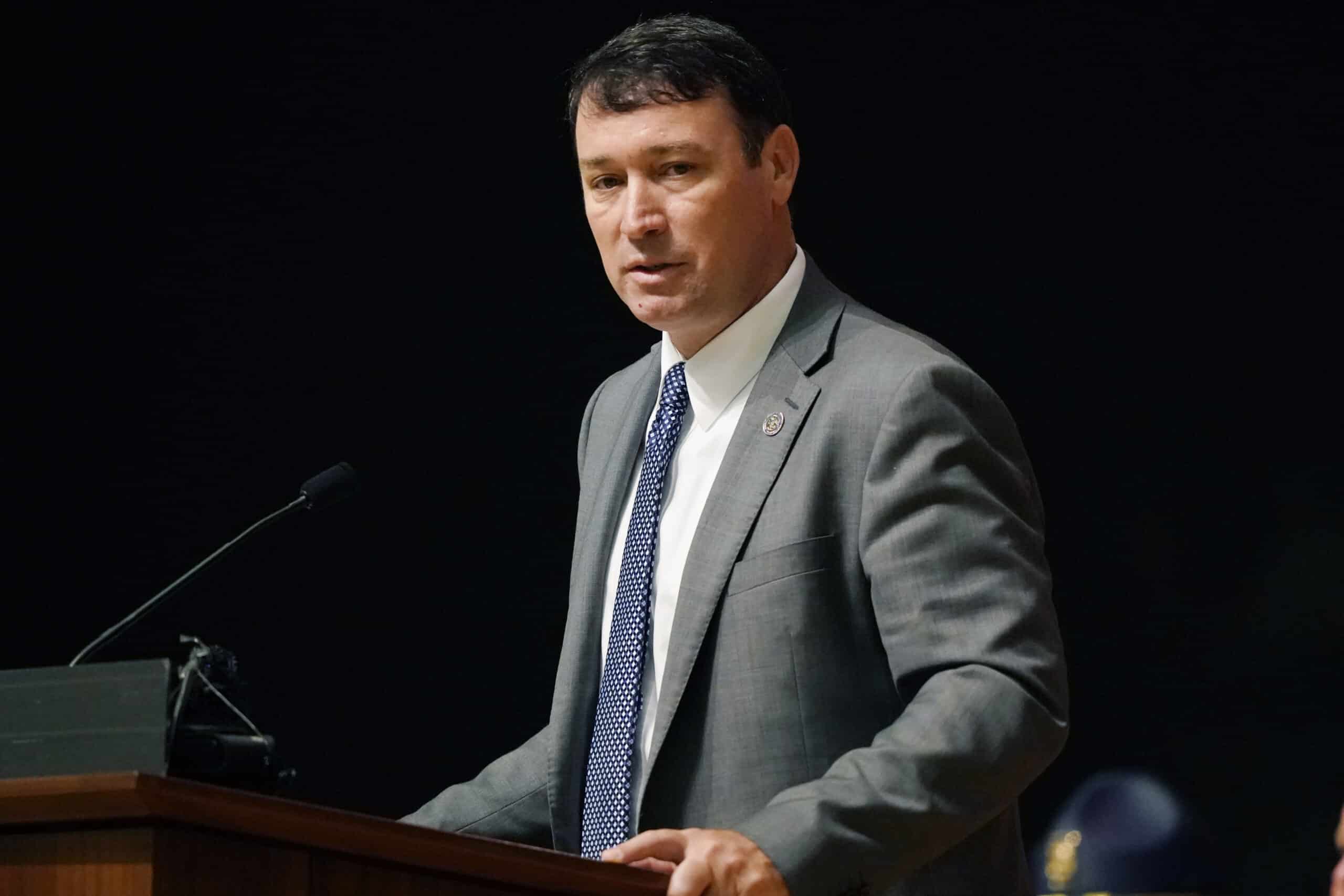Mississippi Today
Mississippi Lawmakers Propose Measures to Oversee Police

Brian Howey and Nate Rosenfield are examining the power of sheriffs' offices in Mississippi as part of The New York Times's Local Investigations Fellowship.
Mississippi lawmakers have introduced a bill that would increase oversight of law enforcement officers and give state authorities more power to punish misconduct after a series of scandals was uncovered across the state last year.
The law would give the state agency that certifies law enforcement officers the ability to investigate claims of police misconduct.
If lawmakers pass the bill, the Mississippi Board on Law Enforcement Officer Standards and Training will gain the power to respond directly to complaints or allegations, putting Mississippi on par with states that regulate officers more aggressively.
If the board ruled that conduct violated professional standards, it could revoke an officer's certification, potentially ending that officer's career in Mississippi.
Under current law, the board can accept complaints but cannot investigate them. The agency largely has focused on running criminal background checks on new officers applying for certification, ensuring they have met basic training requirements and tracking where officers work.
All Mississippi law enforcement officers are currently required to become certified except sheriffs, who are elected officials and are exempt from certification requirements.
The proposed law comes after The New York Times and Mississippi Today published a series of articles last year revealing allegations of sexual misconduct against two sheriffs and exposing a decades-long reign of terror by a group of Rankin County deputies who called themselves the Goon Squad.
Also last year, five Rankin County Sheriff's Department deputies and a local police officer pleaded guilty to federal charges for breaking into the home of two Black men, torturing them, threatening to rape them and then shooting one of them in the mouth.
For years the state ignored or was unaware of allegations of jailhouse rape, brutal beatings and corrupt acts by sheriffs and their deputies.
The revelations have led to increasing calls from the public for accountability.
In Rankin County, just outside Mississippi's capital, Jackson, billboards have sprung up encouraging residents to report police brutality and hate crimes to the F.B.I. The local chapter of the NAACP has repeatedly demanded Sheriff Bryan Bailey's resignation.
“They're tasked with protecting and serving, but they're not protecting and serving. They're harassing, they're terrorizing, they're torturing,” said Cardell Wright, president of the Mississippi Freedom Democratic Party. “We have to have oversight if we're going to abate any of these issues that are happening in our communities.”
State Representative Fred Shanks, a Rankin County Republican who introduced the bill in January, said it would require all officers to complete annual training, a provision he said could improve community relations with the police and protect law enforcement agencies from lawsuits.
“This is both pro-law enforcement and pro-citizen,” he said. “The more training you have, the better you're going to be.”
Mr. Shanks was personally impacted by one law enforcement officer's actions in Rankin County.
According to an investigation by the local district attorney, Sheriff Bailey improperly used grand jury subpoenas in 2014 to obtain phone records belonging to his girlfriend, Kristi Pennington Shanks, who is Mr. Shanks's ex-wife.
The Mississippi Bureau of Investigation examines police shootings, deaths in custody and other misconduct when a local department asks for help. Mr. Shanks's proposal would add a second layer of oversight and could expand the kind of misconduct that is reviewed in a state that has historically resisted police oversight.
“It's long overdue for Mississippi to change a lot of their policies, a lot of their training” related to law enforcement, said Representative Jeffrey Hulum III, a Democrat from Gulfport who said he planned to co-sponsor the measure with Mr. Shanks.
Mr. Shanks wrote the bill with Sean Tindell, the commissioner of the state's Department of Public Safety. Mr. Tindell oversees several statewide law enforcement agencies, including the Mississippi Bureau of Investigation and the law enforcement training academy. Mr. Tindell said that while he and his colleagues had discussed changing the law in the past, the conduct brought to light in 2023 was a factor in pushing for the bill this year.
“I think it's OK to look in the mirror and say, ‘Hey, maybe we need to make some changes,' and this could be that opportunity where everybody feels the same way,” he said. “We can look at a bill like this as a way to improve the overall profession and the perception of that profession.”
Mr. Shanks said that if his proposed law had been in place, many of the events that became public in 2023 could have been investigated by the certification board, even if prosecutors did not bring criminal charges. In some of those cases, charging an officer was made difficult by statutes of limitation or the high bar of evidence required to win a criminal conviction.
Mr. Tindell said leaders of both the Mississippi Sheriffs' Association and the Mississippi Association of Chiefs of Police supported the new bill, giving it a healthy chance to reach the House floor for a vote. A House committee will decide whether to move the bill forward in the coming weeks.
State Senator Juan Barnett, a Democrat from Heidelberg, introduced another measure that could double criminal penalties for law enforcement officers who are convicted of abusing their power.
Legislators have not decided whether to hear that bill. Joey Fillingane, a Republican and the chair of the judiciary committee in the State Senate that will decide if the bill advances, did not respond to requests for comment.
Mr. Barnett said the national push for greater accountability for law enforcement officers inspired him to sponsor the bill.
“We just want to make sure that people feel like they are getting protected and served by the men and women who are in uniform,” he said.
Mississippi Today political reporter Taylor Vance contributed reporting.
This article first appeared on Mississippi Today and is republished here under a Creative Commons license.
Did you miss our previous article…
https://www.biloxinewsevents.com/?p=331854
Mississippi Today
PSC axes solar programs in light of EPA funds, advocates file lawsuit
Advocates from some of the state's conservation groups — such as Audubon Delta, Mississippi Sierra Club and Steps Coalition — spoke out Wednesday against a recent decision by the Mississippi Public Service Commission to suspend several solar programs, including “Solar for Schools,” less than two years after the previous commission put them in place.
“This is particularly disappointing because the need for these incentives in the state of Mississippi is significant,” said Jonathan Green, executive director of Steps Coalition. “Energy costs in the South, and in particular the region known as the Black Belt, are higher than those in other parts of the country for a number of reasons. These regions tend to have older energy generation infrastructure, and housing that has not been weatherproofed to modern standards. For many low- to moderate-income residents in the state of Mississippi, energy burden and energy insecurity represent real daily economic challenges.”
The PSC voted 2-1 at its April docket meeting to do away with the programs, reasoning in part that new funds through the Inflation Reduction Act would be available to the state. About 10 days later, the Environmental Protection Agency awarded $62 million to the state, through the Hope Enterprise Corporation, to help low-income Mississippians afford adding solar power to their homes. The funds are part of the Biden Administration's Solar for All program, one of the several recent federal initiatives aimed at reducing greenhouse gas emissions.
The PSC decision ended three programs the previous commission put in place to encourage wider adoption of solar power through the two power companies it regulates, Entergy Mississippi and Mississippi Power: “Solar for Schools,” which allowed school districts to essentially build solar panels for free in exchange for tax credits, as well as incentives for low-income customers and battery storage.
Last Friday, the Sierra Club filed lawsuits in chancery courts in Hinds and Harrison counties against the commission, arguing the PSC broke state law by not providing sufficient reasoning or public notice before making the changes. Advocates also argued that new funding going to Hope Enterprise won't go as far without the PSC's low-income incentives.
The programs were part of a 2022 addition to the state's net metering rule, a system that allows homeowners to generate their own solar power and earn credits for excess energy on their electric bills. Mississippi's version is less beneficial to participants than net metering in most states, though, because it doesn't reimburse users at the full retail cost. Mississippi's net metering program itself is still in tact.
Northern District Commissioner Chris Brown said that, while he supported efforts to expand solar power, he didn't think programs that offer incentives from energy companies were fair to other ratepayers.

“It's the subsidy that we take issue with,” Brown said at the meeting. “It's not the solar, it's not the helping the schools. We just don't think it's good policy to spread that to the rest of the ratepayers.”
Brown and Southern District Commissioner Wayne Carr voted to end the programs, while Central District Commissioner De'Keither Stamps voted against the motion. All three are in their first terms on the PSC. Brown's position is in line with what the power companies as well as Gov. Tate Reeves have argued, which is that programs like net metering forces non-participants to subsidize those who participate.
Robert Wiygul, an attorney for the Mississippi Sierra Club, countered that argument during Wednesday's press conference, saying that net metering actually helps non-participants by adding more power to the grid and reducing the strain on the power companies' other infrastructure. Moreover, he said, the PSC hasn't offered actual numbers showing that non-participants are subsidizing the program.
“Look, if the commission wants to talk about that, we are ready to talk about it,” Wiygul said. “But what we got here is a situation where these two commissioners just decided they were going to do this. We don't even know what that claim is really based on because it hasn't been through the public notice and hasn't been through the public comment process.”
While no schools had officially enrolled in “Solar for Schools,” which went into effect in January of last year, Stamps told Mississippi Today that there were places in his district getting ready to participate in the very programs the PSC voted to suspend.

“My issue was we should have talked to the entities that were going through the process to (understand what they were doing) to participate in the programs before you eliminate the programs,” he said.
Several school districts in the state are already using solar panels thanks to funding from a past settlement with Mississippi Power. Officials there told Mississippi Today that the extra power generated from the panels has freed up spending for other educational needs. During the public comment period for the 2022 net metering update, about a dozen school district superintendents from around the state wrote in to support the initiative. Ninety-five school districts in the state would have been eligible for the program because they receive power from Entergy Mississippi or Mississippi Power.
Former commissioner Brent Bailey, who lost a close reelection bid in November to Stamps, was an advocate for the schools program that the PSC created while he was there. At the April docket meeting, he pleaded with the new commission to reconsider, arguing that the new federal funding won't have the same impact without those programs.
“My ask is to at least give this program a chance, see where it goes, and hear from stakeholders that have participated,” Bailey said. The solar programs, he added, weren't just about expanding renewable energy, but taking advantage of a growing economy around solar power as well: “We can just stand by and watch it go by, or we can participate in this and bring economic development to the state.”
This article first appeared on Mississippi Today and is republished here under a Creative Commons license.
Crooked Letter Sports Podcast
Podcast: In or out (of the NCAA Tournament)?

College baseball's regular season is in its last week, which means baseball bracketology is a popular activity. State needs to finish strong to become a Regional host. Southern Miss probably has already punched its ticket as a 2- or 3-seed. Ole Miss, playing its best baseball presently, needs victories, period. Meanwhile, the State High School softball tournament is this week in Hattiesburg, and the state baseball tournament comes to Trustmark Park in Pearl next week.
Stream all episodes here.
This article first appeared on Mississippi Today and is republished here under a Creative Commons license.
Did you miss our previous article…
https://www.biloxinewsevents.com/?p=358148
Mississippi Today
Reeves again blocks funds for LeFleur’s Bluff project in Jackson
For the third consecutive year legislative efforts to direct state money to renovate LeFleur's Bluff in Jackson have been stymied, thanks in large part to Gov. Tate Reeves.
Earlier this week, the Republican governor vetoed a portion of a bill that directed $14 million to the office of Secretary of State Michael Watson for work on developing and improving a nature trail connecting parks and museums and making other tourism-related improvements in the LeFleur's Bluff area.
It is not clear whether the Legislature could take up the veto during the 2025 session, which begins in January, though, that's not likely. The Legislature had the option to return to Jackson Tuesday to take up any veto, but chose not to do so.
Of the project, Watson said, “Our office was approached late in the session about helping with a project to revitalize LeFleur's Bluff. As Mississippi's state land commissioner, I was more than happy to help lead this effort not just because it's a natural fit for our office, but also because I believe Mississippi needs a thriving capital city to retain our best and brightest. Investing state funds in state property on a project to enhance the quality of life in Jackson makes good sense.
“Unfortunately, some only support it when it equates to campaign contributions. Sadly, through the line-item veto of the appropriation, Mississippians will once again wait another year for the opportunity to benefit from state investments for the greater public good.”
Various groups, such as representatives of the Mississippi Children's Museum and many other community leaders have been working on the project for years. The area already is the home of the Children's Museum, Museum of Natural History, Mississippi Sports Hall of Fame and Museum and a state park.
The issues with LeFleur's Bluff first arose in 2022 when Reeves vetoed a $14 million appropriation that in part was designed to redesign and create a new golf course in the area. Previously, there had been a nine-hole, state-owned golf course operated by the Department of Wildlife, Fisheries and Parks at LeFleur's Bluff State Park.
In 2022, the LeFleur's Bluff project was one of literally hundreds of projects funded by the Legislature – many of which was tourism projects like LeFleur's Bluff. The governor only vetoed a handful of those projects.
When issuing the LeFleur's Bluff veto, Reeves said the state should not be involved in funding golf courses.
Then last year $13 million was directed to the Department of Wildlife, Fisheries and Parks to spend on the LeFleur's Bluff project. But legislative leaders said state money would not go toward a golf course.
Lawmakers opted to transfer the project to the Secretary of State's office late in the 2024 session, apparently in part because they felt the Department of Wildlife, Fisheries and Parks had not made enough of an effort to begin the project.
Lynn Posey, executive director of Wildlife, Fisheries and Parks, said that before moving forward with the project, “We felt like we needed to do engineering work and see what the situation was. We never got a chance to move forward” because the Legislature redirected the money.
Posey said an engineer's report was needed because “it is a unique piece of land.” He said much of the land is prone to flooding.
He said before that work could begin the Legislature switched the authority to the Secretary of State's office. Posey was appointed to his current position by Reeves, whose office had no comment on the veto.
Lt. Gov. Delbert Hosemann said after the governor's veto, “Projects like the LeFleur's Bluff development are critical to the Capital City, the wider metropolitan area, and our state. Public parks add to the quality of life for our citizens. I am hopeful the individuals involved in this project, including those at the Mississippi Children's Museum, will continue their work to improve this state asset.”
While the Constitution instructs the governor to provide to the Legislature a reason for any veto, Reeves did not do so this year when vetoing the money going to the Secretary of State's office.
On Monday, the governor also vetoed a portion of another bill dealing with appropriations for specific projects. But in this case, the veto was more of a technicality. The bill was making corrections to language passed in previous sessions. In that language were five projects the governor vetoed in 2022.
The language, as it was written, would not have revived those previously vetoed projects, the governor said. But Reeves said he vetoed the five projects out of caution. He did the same in 2023 when those five projects, which included money appropriated in 2022 for the Russell C. Davis Planetarium in Jackson, were carried forward in a bill also making corrections to previously passed legislation.
This article first appeared on Mississippi Today and is republished here under a Creative Commons license.
-
SuperTalk FM3 days ago
Martin Lawrence making 3 stops in Mississippi on comedy tour
-
Our Mississippi Home2 days ago
Beat the Heat with Mississippi’s Best Waterparks
-
Mississippi News6 days ago
Man arrested for allegedly breaking into home, robbing owner
-
Mississippi Today6 days ago
Lawmakers may have to return to Capitol May 14 to override Gov. Tate Reeves’ potential vetoes
-
SuperTalk FM6 days ago
Couple arrested after husband received unemployment benefits while in prison
-
Mississippi News Video5 days ago
Local dentists offer free dental care in Amory
-
Our Mississippi Home3 days ago
Charlie’s U-Pik: Opening Soon for the Summer Season
-
Mississippi News5 days ago
Bond set for West Point couple accused of killing their child




























![HIGH SCHOOL SOFTBALL: Vancleave @ East Central (5/9/2024) [5A Playoffs, South State]](https://www.biloxinewsevents.com/wp-content/uploads/2024/05/1715460379_maxresdefault-80x80.jpg)






